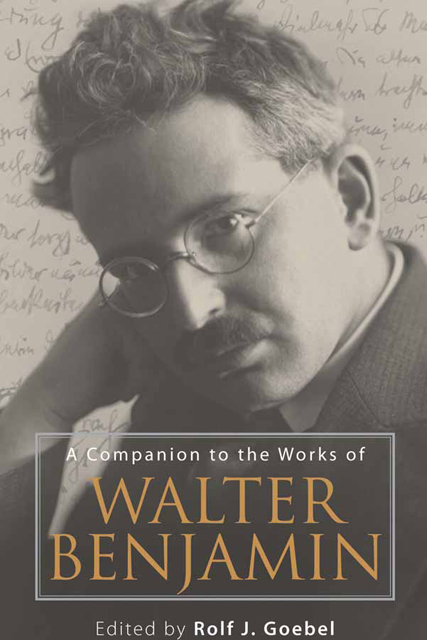Book contents
- Frontmatter
- Contents
- Preface
- Sources of Benjamin’s Works
- Chronology of Benjamin’s Major Works
- Introduction: Benjamin’s Actuality
- 1 Walter Benjamin's Criticism of Language and Literature
- 2 The Presence of the Baroque: Benjamin’s Ursprung des deutschen Trauerspiels in Contemporary Contexts
- 3 Lost Orders of the Day: Benjamin's Einbahnstraße
- 4 Literature as the Medium of Collective Memory: Reading Benjamin’s Einbahnstraße, “Der Erzähler,” and “Das Paris des Second Empire bei Baudelaire”
- 5 Benjamin in the Age of New Media
- 6 One Little Rule: On Benjamin, Autobiography, and Never Using the Word “I”
- 7 The Passagen-Werk Revisited: The Dialectics of Fragmentation and Reconfiguration in Urban Modernity
- 8 Benjamin’s Politics of Remembrance: A Reading of “Über den Begriff der Geschichte”
- 9 The Legacy of Benjamin’s Messianism: Giorgio Agamben and Other Contenders
- 10 Paris on the Amazon? Postcolonial Interrogations of Benjamin’s European Modernism
- 11 Benjamin’s Gender, Sex, and Eros
- 12 Sonic Dreamworlds: Benjamin, Adorno, and the Phantasmagoria of the Opera House
- Select Bibliography and List of Further Reading
- Notes on the Contributors
- Index
10 - Paris on the Amazon? Postcolonial Interrogations of Benjamin’s European Modernism
Published online by Cambridge University Press: 28 February 2023
- Frontmatter
- Contents
- Preface
- Sources of Benjamin’s Works
- Chronology of Benjamin’s Major Works
- Introduction: Benjamin’s Actuality
- 1 Walter Benjamin's Criticism of Language and Literature
- 2 The Presence of the Baroque: Benjamin’s Ursprung des deutschen Trauerspiels in Contemporary Contexts
- 3 Lost Orders of the Day: Benjamin's Einbahnstraße
- 4 Literature as the Medium of Collective Memory: Reading Benjamin’s Einbahnstraße, “Der Erzähler,” and “Das Paris des Second Empire bei Baudelaire”
- 5 Benjamin in the Age of New Media
- 6 One Little Rule: On Benjamin, Autobiography, and Never Using the Word “I”
- 7 The Passagen-Werk Revisited: The Dialectics of Fragmentation and Reconfiguration in Urban Modernity
- 8 Benjamin’s Politics of Remembrance: A Reading of “Über den Begriff der Geschichte”
- 9 The Legacy of Benjamin’s Messianism: Giorgio Agamben and Other Contenders
- 10 Paris on the Amazon? Postcolonial Interrogations of Benjamin’s European Modernism
- 11 Benjamin’s Gender, Sex, and Eros
- 12 Sonic Dreamworlds: Benjamin, Adorno, and the Phantasmagoria of the Opera House
- Select Bibliography and List of Further Reading
- Notes on the Contributors
- Index
Summary
Introduction
THE FIRST PUBLICATION OF Walter Benjamin's Passagen-Werk (The Arcades Project; GS V.1 and V.2) in Latin America — the Brazilian edition, launched in 2006 under the title Passagens — promises, together with the Spanish version published in 2005 in Barcelona, to inaugurate a new phase of reception on this continent. In this context I wish to inquire into the usefulness and significance of Benjamin's study on the European metropolis of Paris for a better understanding of huge cities on the “periphery” of the world, such as Rio de Janeiro, Buenos Aires, Ciudad de Mexico, and São Paulo. To what degree, one may ask, are the categories of the Passagen-Werk transferable and operational with regard to these new metropolitan centers; what kind of complementary categories should perhaps be created to take account of the difference between these cities and the traditional European metropolis, such as Benjamin's Paris of the nineteenth century; and, last but not least, what may the “hegemonic centers” learn from the specific historical experience of peripheral cultures?
I propose to study these questions from the perspective of “histoire croisée” or “entangled history.” Elaborated in recent years by scholars such as Michael Werner and Bénédicte Zimmermann, this method tries to overcome the concepts of unilateral “cultural transference” and “asymmetric comparison,” which frequently continue to be tributaries to the idea of a cultural “mission” of hegemonic countries intent on imposing their cultural values on the rest of the world. Major components of the “histoire croisée” are the interaction between colonial powers and colonized countries, the crossing and reversibility of points of view, the inclusion of the voices of the excluded, the historicity and “constructedness” of cultural patterns, the entanglement of perspectives, and the hybridity of cultures. Together they reflect the influence of four decades of postcolonial studies, such as those of Frantz Fanon; Edward W. Said; Bill Ashcroft, Gareth Griffiths, and Helen Tiffin; and Homi Bhabha, among others. In the field of Benjamin studies, I have tried to “actualize” (cf. N2,2) Benjamin's portraits of European cities by testing their applicability to the knowledge of a Third World megalopolis such as São Paulo, establishing for this purpose intertextual relations with Brazilian writers.
- Type
- Chapter
- Information
- A Companion to the Works of Walter Benjamin , pp. 216 - 245Publisher: Boydell & BrewerPrint publication year: 2009



